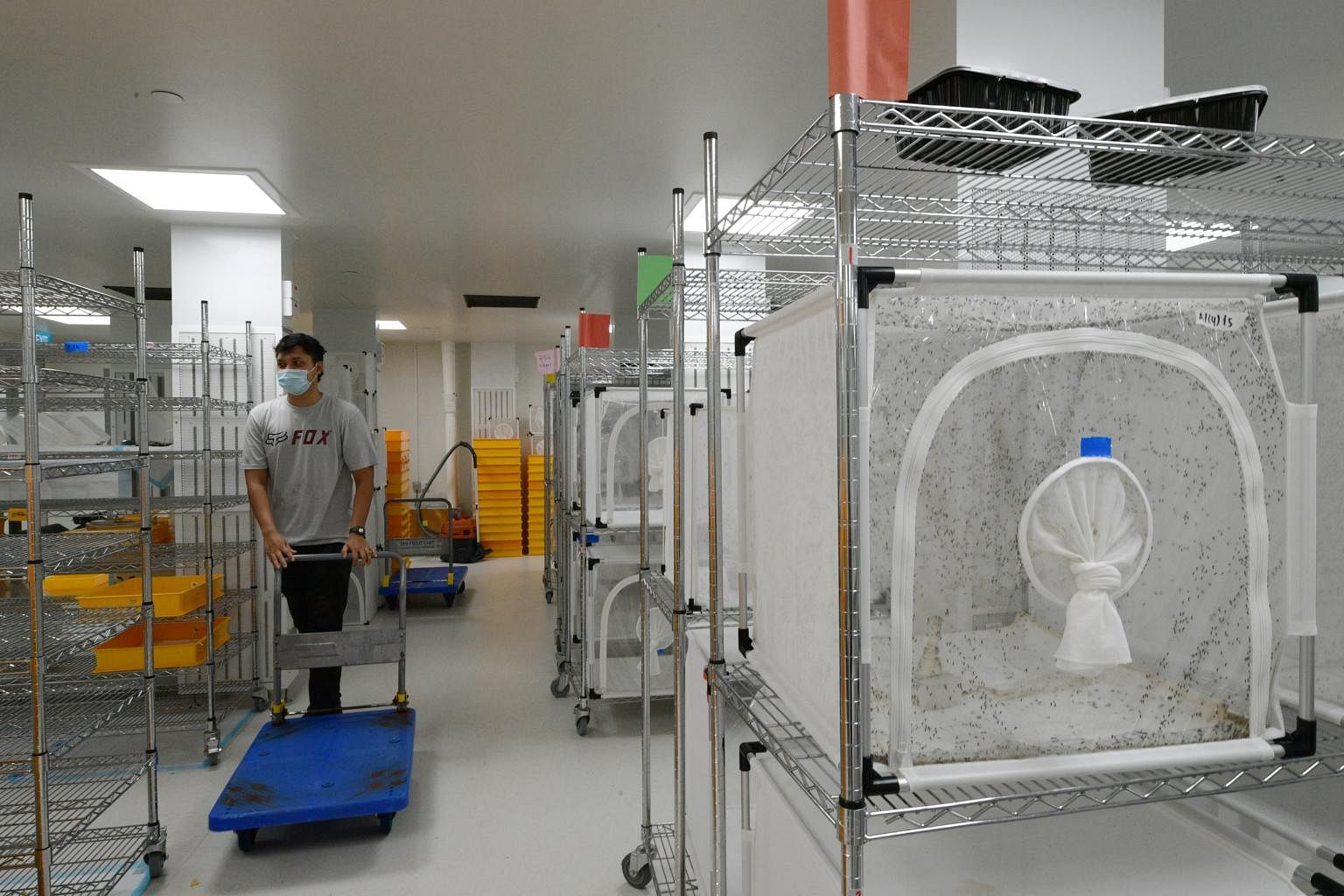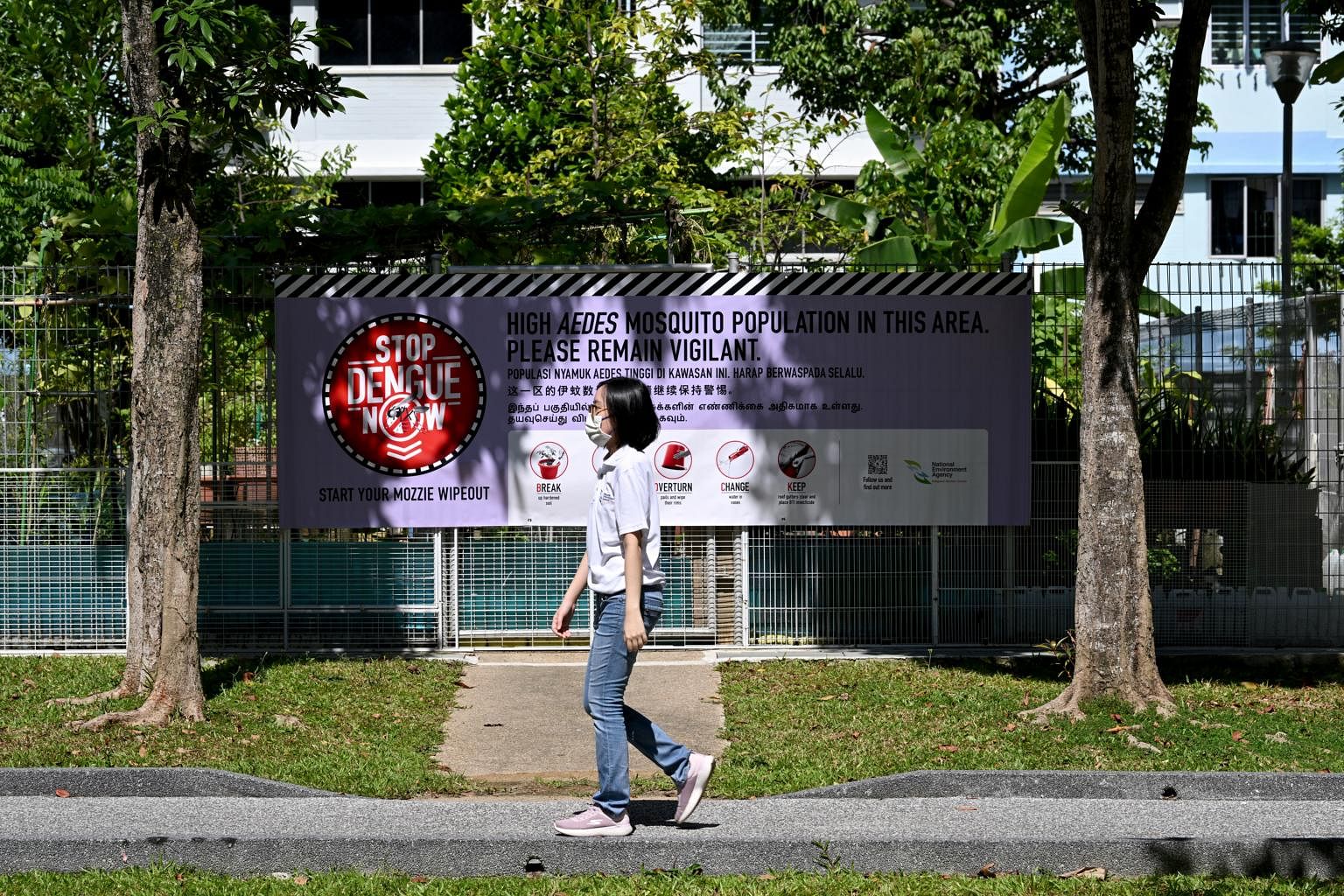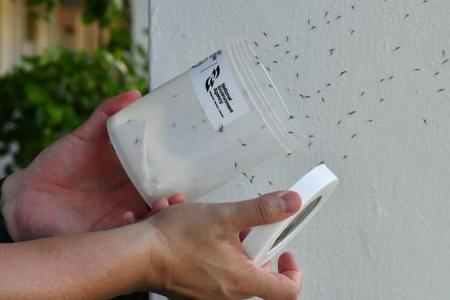Project Wolbachia to be expanded to 1,400 more HDB blocks from July as dengue cases surge
Project Wolbachia, one of the nation's weapons in the fight against dengue, will be expanded to 1,400 more Housing Board blocks from July, Minister for Sustainability and the Environment Grace Fu announced on Wednesday (June 15).
This means the project, currently active in 1,800 blocks, will cover more than 300,000 homes, nearly twice the 160,000 homes currently, and about 31 per cent of HDB blocks in Singapore.
This comes amid concerns that infections here will continue rising, and Ms Fu said that weekly cases may soon cross 2,000.
She was delivering the keynote address at the fifth Asia Dengue Summit, which was organised by the Asia Dengue Voice and Action group and held in Orchard Hotel from June 13 to 15.
This is Singapore's first time hosting the summit, which saw more than 200 clinicians, researchers, government public health leaders and policymakers from across Asia coming together to discuss dengue management strategies for the region.
As at June 14, more than 15,000 cases of dengue have been reported in Singapore in 2022. The numbers are expected to rise even further as the nation has entered the traditional peak dengue season, which usually lasts from June to October.
“This urgent situation calls for everyone, including individuals and premise owners, to do their part to break disease transmission bybeing vigilant against stagnant water and potential mosquito breeding habitats in our homes and premises,” said Ms Fu.
Professor Duane Gubler, dengue expert advisory panel chairman and Emeritus Professor at Duke-NUS Medical School, said that “business-as-usual” is not an option given the escalating threat of dengue.
“Novel technologies, including Wolbachia and dengue vaccines, provide new tools to complement and strengthen existing dengue control efforts, and prevent epidemic transmission of this disease,” he said.
Launched in 2016, the project involves the release of male Aedes-aegypti mosquitoes infected with the Wolbachia bacteria at selected sites. When female Aedes mosquitoes which are not infected with the bacteria mate with the males, they produce eggs which do not hatch, thus reducing the population of Aedes-aegypti mosquitoes - the main vector of dengue here.
Speaking at the conference on Wednesday, Associate Professor Ng Lee Ching, group director of the Environmental Health Institute at the National Environment Agency (NEA), said that Project Wolbachia has had an “eraser effect” at its current deployment sites, reducing the incidence of dengue in areas such as Tampines and Yishun by up to 70 per cent so far this year.
“The results in existing study sites (have) shown the effectiveness of the Wolbachia technology in the reduction of Aedes aegypti mosquito population in these areas,” she said.
Ms Fu said that the expansion of the trial, which will see Project Wolbachia deployed at a total of 13 sites, up from the current five, will allow the authorities to understand the impact of large scale multi-site deployments.
The additional eight sites are: Bedok North, Bedok Reservoir, Choa Chu Kang (Yew Tee), Geylang, Hougang, Punggol, Sengkang and Woodlands.
The sites were chosen based on several factors: historical dengue risk level, Aedes aegypti population, the size and landscape of the area, and NEA’s capacity for producing and releasing the mosquitoes.

To support its project expansion, NEA will increase the number of male Wolbachia-Aedes mosquitoes produced per week from the current two million to five million by the end of this year, she said.
Ms Fu added that good environmental management to prevent breeding of mosquitoes is the cornerstone of the NEA's dengue control programme, complemented by strong partnerships across the public, private and people sectors.
A person living in Singapore today is 10 times less likely to get infected with dengue for the first time than someone here in the 1960s, said the minister.
But she noted that this also means there is falling population immunity to dengue here.
And while Wolbachia technology is promising, it is not an instant, one-stop solution to the dengue problem, and Ms Fu said that the impact of technology is maximised when coupled with existing community efforts.
"Ultimately, individual and community responsibility and actions are still the most critical elements of dengue control."
Prof Gubler said: “The results observed with Project Wolbachia to date are promising, but it is important for the Singapore community to realise that it is not the silver bullet that will control dengue alone. It is thus important for the community to continue staying vigilant and take steps to fight dengue.”

Speaking at the summit on Wednesday, Associate Professor Daniel Goh, who is from the department of paediatrics at National University Hospital, noted that June 15 is also Asean Dengue Day.
Calling the disease a global and regional threat, Dr Goh said that it places a major burden on public health, a sector that is already dealing with the evolving Covid-19 pandemic.
"Addressing the increasing trend of dengue requires commitment, cooperation and multi-sectoral sustained responses from the public and private sectors and governmental bodies and, more importantly, affected communities," he said.

Get The New Paper on your phone with the free TNP app. Download from the Apple App Store or Google Play Store now

